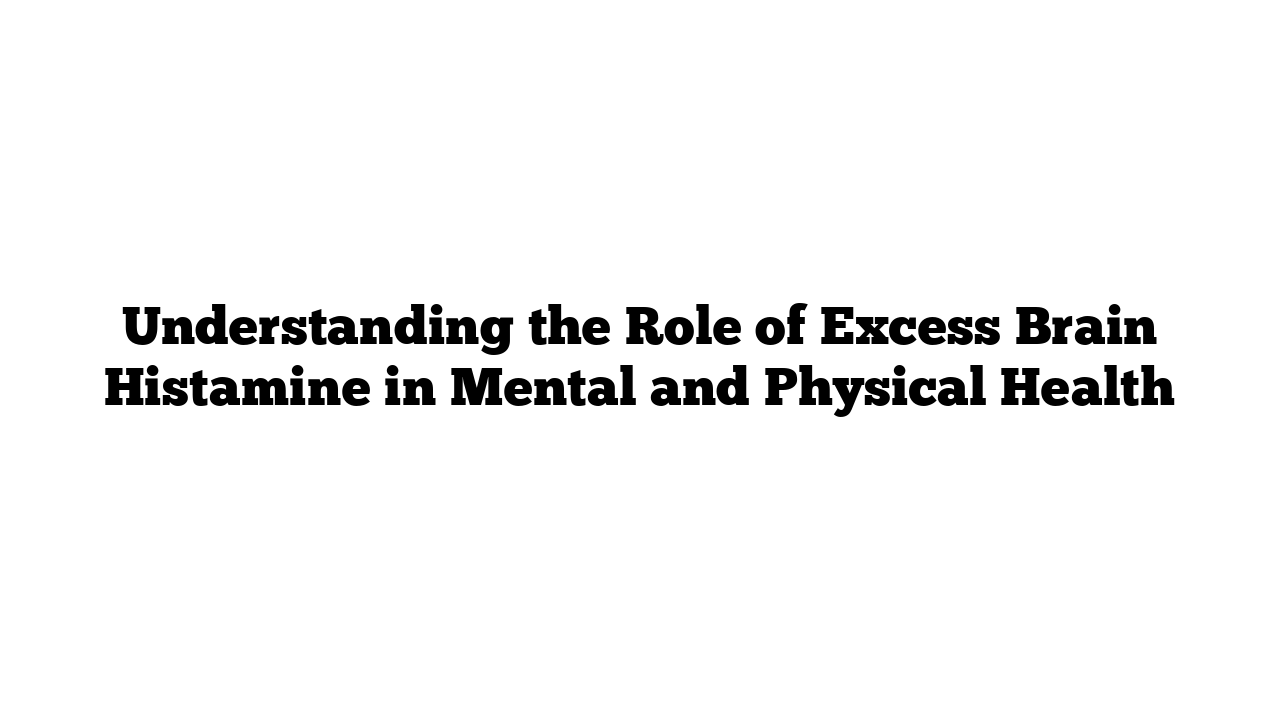Is Excess Brain Histamine Causing Your Symptoms?
Histamine might be known as the culprit behind seasonal allergies—causing itchy eyes, a runny nose, or even hives—but its role in the body goes much deeper. Histamine is a powerful signaling molecule, influencing everything from mood and memory to sleep cycles and stress responses. If you’ve been struggling with issues like brain fog, poor sleep, or chronic fatigue, excess brain histamine could be a hidden factor.
Let’s explore how histamine affects the brain, the symptoms associated with excess histamine, and why balancing histamine levels is vital for both mental and physical health.
What is Histamine and How Does it Work?
Histamine is a chemical released by the immune system that acts as a communication signal between cells. While you may know it from its role in allergic reactions, histamine influences the brain in various ways. It operates through four distinct receptors—H1, H2, H3, and H4—that can create different effects based on the tissue where they’re activated.
For example, in the brain, histamine plays a significant role in:
- Mood regulation
- Memory
- Motivation
- Appetite control
Each receptor has a unique impact on these functions, which makes histamine much more complex than just an “allergy chemical.”
Histamine and Brain Health: The Four Receptors
- H1 Receptors: Often linked to allergic symptoms, H1 receptors in the brain also influence alertness and can impact sleep. This explains why some antihistamines, like Benadryl, cause drowsiness.
- H2 Receptors: These receptors are involved in stomach acid regulation but can also affect blood flow within the brain.
- H3 Receptors: These play a big role in neurotransmitter release, impacting dopamine, serotonin, and norepinephrine. Imbalances in H3 activity can affect mood, attention, and pain perception.
- H4 Receptors: Primarily found in the immune system, H4 receptors contribute to inflammation, potentially affecting brain inflammation and immune responses.
By understanding how these receptors work, we can see how histamine imbalances might lead to symptoms like brain fog, mood swings, and even chronic pain.
Excess Brain Histamine: Symptoms and Implications
Excess histamine in the brain can lead to a range of challenging symptoms. Here’s how it might be impacting your daily life:
1. Brain Fog and Mental Fatigue
Brain fog is a common complaint among those with high histamine levels. When histamine isn’t properly broken down, it accumulates and floods the brain, leading to mental exhaustion, trouble focusing, and memory issues.
2. Insomnia and Sleep Disturbances
Histamine helps regulate wakefulness and is essential in maintaining alertness. However, too much histamine disrupts the sleep-wake cycle, contributing to insomnia and conditions like narcolepsy. In fact, histamine-related issues might be a factor in 70% of narcolepsy cases in the USA.
3. Increased Pain Sensitivity
Histamine also affects how we perceive pain. If you have fibromyalgia, neuropathy, or chronic pain, excess histamine might be causing your nerve cells to fire more frequently, increasing pain sensitivity.
4. Mood and Mental Health Problems
Histamine impacts mood-regulating neurotransmitters like dopamine, serotonin, and norepinephrine. High histamine levels are often linked to conditions such as ADHD, anxiety, depression, and panic disorders. This is largely due to the inflammatory response histamine induces in the brain and its effects on neurotransmitter release.
“Histamine has been suggested as a whole-brain activity regulator,” says Dr. Hagmire, pointing to its powerful influence on brain health.
Histamine’s Role in Appetite and Weight Management
Histamine in the brain also influences hunger and appetite. High levels can curb appetite, while low levels or blocked histamine receptors (e.g., through antihistamines) can make us feel hungrier and lead to weight gain. If you’ve noticed changes in your appetite or unexpected weight gain while taking antihistamines, histamine imbalances could be a factor.
Leptin Resistance and Binge Eating
Histamine affects leptin, the hormone responsible for suppressing hunger. Leptin resistance, often tied to high histamine, can lead to binge eating, emotional eating, and other unhealthy habits that contribute to weight issues.
The Blood-Brain Barrier: Histamine’s Impact on Brain Protection
Histamine influences blood flow in the brain and can weaken the blood-brain barrier—a protective shield that prevents harmful substances from entering brain tissue. This barrier breakdown can be a significant issue for individuals with stroke, epilepsy, or inflammatory diseases like MS.
Histamine also contributes to the risk of “leaky brain”, similar to the concept of leaky gut, where the brain barrier becomes permeable. This allows potentially harmful substances to penetrate the brain and disrupt neurological health.
Dealing with Excess Brain Histamine
Managing brain histamine levels isn’t as simple as taking antihistamines or following a low-histamine diet. Here are some ways to help reduce symptoms and balance histamine levels:
- Identify Histamine-Triggers: Foods high in histamine or those that promote histamine release—like fermented foods, alcohol, and aged cheeses—can exacerbate symptoms. Avoid these if you’re sensitive.
- Optimize Enzyme Function: The body relies on enzymes like DAO, HNMT, and MAOB to break down histamine. If you suspect an enzyme deficiency, it’s worth discussing with a healthcare provider.
- Consider Lifestyle Modifications: Stress, lack of sleep, and environmental toxins can increase histamine production. Reducing stress and improving sleep quality can help manage histamine levels.
The Bigger Picture on Histamine
Histamine is essential to our body’s daily function and isn’t something that should be avoided at all costs. It’s not inherently bad; in fact, it plays vital roles in immunity, gut health, and brain function. The key is finding balance. Excess or deficiency in histamine levels can lead to various physical and mental health challenges.
If you’re experiencing symptoms like brain fog, mood changes, chronic pain, or unexpected weight gain, consider that histamine imbalance could be at the root. Talk to your doctor to explore testing options and potential treatment plans.
For more detailed insights on histamine and how it impacts health, visit medicaltimes.io, where you’ll find a range of resources written and explained by medical professionals. Histamine plays a critical yet complex role in the brain and body, and finding the right approach is essential for optimal health and well-being.
